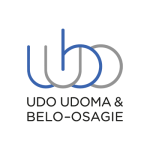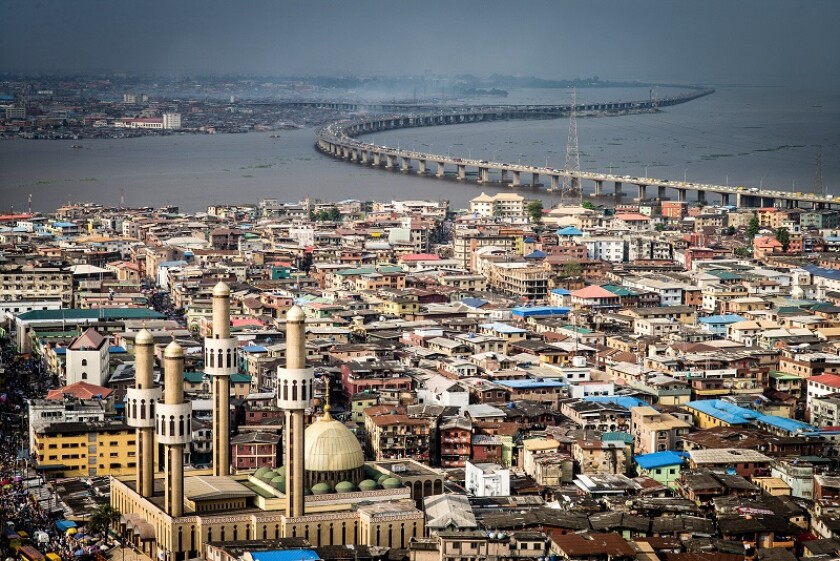An overview of infrastructure project financing in Nigeria, by Nicholas Okafor and Adeola Sunmola of Udo Udoma & Belo-Osagie
The Nigerian government, like that of many developing countries, had traditionally financed the construction of roads, bridges, air and sea ports and power projects from its fiscal budgets, with insignificant support from the private sector. On account of increasing economic pressure on fiscal budgets however, this approach has become less popular and private sector-led project financing and development have become widespread.
The Nigerian project finance landscape has witnessed significant growth in the past few decades and project finance continues to be utilised in funding significant projects.
Some of the notable infrastructure projects that have been developed through project finance include: the 2.5 million metric tonne Unicem Cement Plant; the Azura Edo Power Project; the Accugas Central Processing Facility and some key strategic pipelines in the Niger Delta region financed and owned by Accugas; the Eko Atlantic City; and the Dangote Oil integrated refinery and petrochemical complex, amongst others.
Funding of recent projects has been by syndicates of foreign banks, development finance institutions, local commercial banks and export credit agencies.
Prevailing project environment
Nigeria is busy with projects ranging from real estate to healthcare (hospitals), roads, rails, ports, power and other utilities. However, power does still dominate, given the fact that electricity supply is the bedrock of any nation's development.
Starting at real estate, large-scale housing projects were traditionally funded by the government. Many state governments across the country have established housing and development corporations that are responsible for developing residential and commercial real estate projects across the states. While state governments continue to do this, private sector investors now increasingly finance and construct commercial and residential real estate developments, sometimes in collaboration with the government on a PPP basis. There have been several strategic collaborations between the private sector and the Federal Government of Nigeria (FGN) aimed at addressing the housing deficit in the country. The continuing expansion of Nigeria's middle class has made investments in condominiums and shopping malls a popular choice for private capital. The development of shopping malls across the country, through project finance, has increased significantly in the past 15 years on account of the rapid transformation of the Nigerian retail industry and urbanisation. Projects which have been constructed by a form of project finance include the Palms Shopping Mall (Lagos); Festival Mall (Lagos); Ikeja City Mall (Lagos); Palms Mall (Ilorin); Grand Towers Abuja Mall; Aba Mega Mall; and Enugu Polo Park Mall, among others.
|
|
In the power sector, the sponsor typically negotiates and executes a put and call option agreement (PCOA) with the FGN |
|
|
Port projects have also traditionally been funded by government revenue. This has now changed, especially in relation to sea ports, and there are now many projects being designed, developed and financed by the private sector. These include the Lekki Deep Water Port, Bakassi Deepwater Port, Badagry Deep Sea Port, Onne Deep Sea Port and Ibom Deep Sea Port, all of which have or are expected to have project finance elements.
The rail sector continues to be financed significantly from the government budget. The Lagos State Light Rail Project started out as private sector driven but was taken over by the Lagos State Government. Recognising the interdependence of infrastructure projects, the FGN recently issued a directive that every seaport should have complementary rail infrastructure. Other rail projects that have recently been financed from government revenues include the Abuja Metro Light Rail, Lagos-Ibadan standard gauge railway, Warri-Itakpe-Ajaokuta rail line and Abuja-Kaduna railway.
The construction and rehabilitation of roads were also previously government funded. This has now changed, and many developers have raised finance to develop and construct road networks across the country. An example is the pioneer Lekki Toll Road Concession, which was conceptualised as a PPP scheme, which the sponsors executed through project finance. The second Niger Bridge in the Eastern part of the country is also being project financed.
Keeping the lights on
Unlike some other sectors of Nigeria's economy, which were open to private sector participation, the Nigerian power sector remained fully government-owned until 2001.
In 2001, the FGN introduced the National Electric Power Policy, which set the ball rolling for the privatisation of the Nigerian power sector and was shortly followed by the enactment of the Electric Power Sector Reform Act (EPSR Act) in 2005. The EPSR Act provided the legal framework for the reform of the power sector and established the Nigerian Electricity Regulatory Commission (NERC) as an independent regulator for the Nigerian electricity supply industry (NESI). NERC has the power to make regulations relating to all activities in the NESI, including the power to issue licences, regulate competition, tackle abuses of market power and issue and regulate tariffs, amongst other things. Additionally, the Power Holding Company of Nigeria (PHCN) was created, while six generation companies (Gencos), 11 distribution companies (Discos) (collectively, the successor companies) and the Transmission Company of Nigeria (TCN, which remains fully government owned) were incorporated to assume the assets and liabilities of the PHCN ahead of the power sector's privatisation.
The reforms also included the establishment of Nigerian Bulk Electricity Trading Plc (NBET) as a creditworthy off-taker to purchase electricity from the Gencos under power purchase agreements (PPAs) and sell the energy to Discos under Vesting Contracts. Following the privatisation of the power sector, the assets and liabilities of the PHCN were transferred to the successor companies and the PHCN was subsequently liquidated.
These reforms paved the way for the development and financing of state-owned and private sector-owned independent power projects (IPPs) such as the Ibom Power Project and the Aba IPP. Others include the construction and financing of the Azura Edo Gas-Fired Power Plant in Edo State; the Oma Power 500 MW Independent Gas Power Project in Abia State; and the Century Power 495 MW Open Cycle Power Plant in Anambra State etc.
Engine room for infrastructure development
The PPP model has been implemented in various sectors, such as transportation (road, rail, seaports and airports), health and most recently, power. PPPs may be structured as concessions by government to qualified corporations.
For infrastructure projects involving the FGN, the project development process begins with the evaluation of the project by the Infrastructure Concession Regulatory Commission (ICRC). This agency is responsible for facilitating and coordinating the implementation of the PPP process, building capacity for project development, tendering, negotiation and contract execution.
Upon evaluation, the contracting authority (ministries, departments and agencies – MDAs) prepares an outline business case (OBC) of the project for Federal Executive Council (FEC) approval. The FEC, with the assistance of the ICRC, approves the infrastructure project to be implemented through the PPP model. Upon the FEC's approval of the OBC, the ICRC commences an open competitive bidding process following which, a preferred bidder is selected. The MDA thereafter prepares a full business case (FBC), which it submits to the FEC for approval. Once the FEC approves the FBC, the MDA enters into a PPP contract with the preferred bidder.
Depending on the type of infrastructure project that is being undertaken, other regulatory agencies may be involved; for example, the Nigerian Ports Authority is the regulator responsible for monitoring the construction, operation and use of ports in Nigeria; the Nigerian Railway Corporation has the power to grant approvals for the construction of new railway lines; and the Federal Airports Authority of Nigeria oversees the operations and maintenance of the Nigerian aviation sector.
Six steps from early stage to refinancing
Infrastructure projects in Nigeria have a common trajectory in terms of early stage development to refinancing. The recurring process includes six steps.
In the first phase, the project is identified and evaluated by the sponsor to ensure feasibility, bankability, identification of risks and their allocation and mitigation, environmental impact assessments and technical studies. Once completed, a project company (typically a limited liability special purpose vehicle (SPV)) is set up to execute the project. In many projects in Nigeria, the SPV is a holding company with its shareholders incorporated in commercially friendly jurisdictions.
Having successfully evaluated the project, the project sponsor appoints advisers (legal, financial, technical and environmental etc) to carry out tasks including due diligence, identification of applicable licences and the overall project management strategy, including the determination of the debt to equity ratio. After due diligence is completed and recommendations from advisers are implemented, the project sponsor and its advisers begin negotiating with and obtaining commitments from financers. The sponsors and their advisers will also apply for and obtain the relevant licences to implement the project.
|
|
Lenders will be paid in full even though the equity investment may either be recovered in full or impaired |
|
|
The financing phase includes appointing a mandated lead arranger (MLA) or financial adviser. This is usually a bank or underwriter that facilitates and leads a group of lenders in a syndicated loan for major financing. As a requirement of its mandate, the MLA will be committed to raising debt financing. During the financing stage, the lenders to the project will also undertake due diligence on the project and its sponsors in order to determine whether any legal, regulatory, tax or other risks exist that need to be addressed prior to the disbursement of funds.
Next is documentation, which involves the negotiation, drafting and execution of project and finance documents. For Nigerian infrastructure projects, these include equity, loan and security documents. These documents will address how any risks which the lenders may otherwise be exposed to could be mitigated prior to or when the loan deteriorates. Lenders typically insist on documenting control structures, which provide early stage signals as well as triggers to allow lenders to protect their position if the project begins to deteriorate and debt service is imminently threatened.
In the power sector, the sponsor typically negotiates and executes a put and call option agreement (PCOA) with the FGN, which transfers the termination payment risk from NBET directly to the FGN, in the event that the PPA or the concession agreement is terminated. A put option allows the holder of the option, usually the IPP, to compel the government, upon the occurrence of certain events, to purchase the power plant at a pre-determined price. A call option, on the other hand, permits the holder of the option, usually a government entity, to compel the seller, upon the occurrence of certain events, to sell the power project at a pre-determined price. The quantum of termination payments that will be received by an IPP under the PCOA will depend on whether the termination of the PPA the result of a seller default, a buyer default or a force majeure event was. One risk that is covered in the PCOA, regardless of the cause of the termination of the PPA, is that debt outstanding to lenders will be paid in full even though the equity investment may either be recovered in full or impaired depending on the cause of the termination.
The Azura-Edo IPP is a beneficiary of the PCOA regime, which has now been widely accepted in the power sector. Other PCOAs are being negotiated in connection with power plants constructed under the National Integrated Power Project as well as other greenfield projects.
At the completion and financial close stage, all conditions precedent to the disbursement of the loan are satisfied, a utilisation request is issued in accordance with the finance agreements and the lenders disburse the funds for the project. Lenders to Nigerian infrastructure projects will usually insist on the delivery of licences required for project construction and operation, and on the perfection of security, in their favour, prior to the disbursement of the loan.
Following disbursement of funds to the project, the EPC contractor will begin construction. After testing and commissioning the project to achieve commercial operation, the operation and maintenance aspects of the project kick in.
Most projects in Nigeria are financed using medium-term loans, with a tenor of five to 10 years. Refinancing is, therefore, a common feature. In some cases, there are cost overruns which need to be funded by refinancing the project debt and, in many cases, also, some projects require additional funds to upscale the project. One of the key concerns of new lenders to a project is the ability to 'inherit' or 'port' the existing security package in favour of new lenders without compromising their position as a beneficiary of security. The Nigerian debt market has now accepted the trust structure and a process for supplementing security in favour of a changing pool of lenders to the same project.
Concerns, bankability and risks
A bankable project is simply one in which risk has been allocated in a way that satisfies the project lenders. The lenders to Nigerian infrastructure projects will typically look out for the following:
Certainty of the project cash flows for meeting debt service requirements
Stability of the legal framework for the project including licence extension when existing licenses expire
Effectiveness and enforceability of project contracts and related financing and security documents
Identification, allocation and mitigation of project risks
Confidence in the regulatory regime and government's ability to honour/respect contractual rights and obligations- sanctity of contracts
Right to step in if a project fails
Ability of contractors to perform, quality of contractor guarantees and availability of alternative contractors
Reputational impact of the project
Availability and effectiveness of insurance cover, where needed.
Protection of lender rights (for example, security rights, priority in insolvency)
Residual value of project assets upon termination
The manner in which risks, in Nigerian project finance transactions are mitigated often include seven key types of risk.
Regulatory risk can appear as a delay in granting or renewing permits, refusal or cancellation of the permits needed to start the project, or the unexpected cancellation or revocation of concessions on which the project is based. There could be unexpected delays caused by inefficiency in public administration or a change in legislation that hinders the operation of the project. These could be mitigated using government guarantees or partial risk guarantees and insurances from multilateral agencies to which the Government will issue an indemnity agreement.
The principal construction risks are unscheduled delays and budget overruns. Mitigating these risks involves a detailed evaluation of the contractor and its experience with similar projects, its reputation in the sector and track record. For Nigerian infrastructure projects, lenders would typically seek to mitigate this risk by entering into direct agreements with the counterparties to give the lenders step in rights if a contractor defaults in its obligations to the project company. Additional mitigants include the inclusion of a performance bonus and liquidated damages clauses in the construction contract, use of completion guarantees, letters of credit for revenue shortfall, amongst others.
|
|
For Nigerian power projects, payment risk mainly relates to the liquidity of the power off-taker, NBET |
|
|
Operating risks rest on the efficient and continuous operation of the project and are generally associated with the adequacy and track-record of the operations and maintenance contractor. Mitigants in this area include the appointment of technically competent operators with proven track records in managing similar projects and the inclusion of liquidated damages in the operations and maintenance contracts executed with them.
Foreign exchange or currency risk occurs when there is exchange rate fluctuation or currency control, i.e. the sovereign government limits the project company's access to foreign exchange or curtails its ability to make foreign currency payments outside of the country. This risk can be mitigated using insurance and hedging products or a currency swap.
Economic performance (or market risk) is the risk that demand for the product may decline or fluctuate widely. This risk is mitigated using offtake agreements, and in the Nigerian power sector, this would be the 20-year PPA executed between the project company (as seller) and the NBET (as buyer/off-taker). The PPA guarantees the purchase of the electricity generated for a term of 20 years.
For Nigerian power projects, payment risk mainly relates to the liquidity of the power off-taker, NBET. To strengthen the NBET's creditworthiness, current PPAs require that the NBET provide some form of payment security to guarantee the payment to IPPs, of capacity and energy delivered to NBET. This payment security is documented in the form of a letter of credit issued by a bank in favour of the IPP, which is assigned to the project lenders by way of security. The letter of credit guarantees payment by the issuing bank if NBET defaults in its obligations to the IPP under the PPA. In cases where the letter of credit was issued by a bank under a partial risk guarantee issued by a multilateral agency, it is also not unusual to have an indemnity agreement under which FGN will undertake to reimburse the Multilateral institution if it pays the bank that issued a letter of credit to the IPP on behalf of NBET. Project lenders, in the Nigerian power sector, will typically insist that the IPP should assign, by way of security, any letter of credit issued by NBET to the IPP either directly or under a partial risk guarantee provided by a multilateral institution. This risk is also mitigated by the terms of the PCOA, which provides for termination payments in the event that the PPA is terminated before the 20-year tenor lapses.
Force majeure risk comprise events that may be considered "acts of God" that would give the EPC contractor or any project party legitimate reasons to delay the project, withhold payment, cease work, or cancel the contract for reasons such as changes within the country's political landscape (ie, change of administration, expropriation, changes in laws or regulatory frameworks etc). A key specific mitigant includes political risk insurance against force majeure events. A number of projects in Nigeria, including the Azura Edo Power Project, have benefited from an array of World Bank Group instruments used to structure the project financing, including partial risk guarantees from the IBRD as well as political risk insurance cover for equity, swaps and commercial debt from MIGA.
A natural fit
The development of major infrastructure projects in Nigeria is capital intensive and naturally looks to project financing. Project finance provides a means of funding the construction of projects that might otherwise be delayed or foregone. There remains continuing interest in the development of infrastructure projects in Nigeria, particularly in the agriculture, mining, power, manufacturing, transportation (roads, rail and port), solid minerals, healthcare, housing and services sectors, in line with FGN's vision 2020.
Note: The authors acknowledge Ifechukwude Obiago and Marcus Ojaruega for their contributions to this article.
About the author |
||

|
|
Nicholas Okafor Partner, Udo Udoma & Belo-Osagie Lagos, Nigeria T: +234 14622307-12 W: www.uubo.org Nicholas Okafor heads the firm's power team. His core specialisations are energy (including electric power), projects and infrastructure transactions. He has been involved in numerous transactions and issues as diverse as establishment, operation and maintenance of IPPs, debt restructuring, derivatives and transactions involving capital raising in the ICM through the issuance of Eurobonds. He is ranked by IFLR1000 as Highly Regarded and is considered "a leader in the project development space with robust knowledge of the intricacies within Nigerian law". He is also recognised by Chambers in the banking & finance and projects & energy practice areas. Nicholas routinely advises generation and distribution companies on resolving the issues arising from liquidity challenges in the power sector, including corporate restructuring, refinancing and advocacy through industry organisations such as the Association of Electricity Distributors (ANED) and the Association of Power Generation Companies (APGC). |
About the author |
||

|
|
Adeola Sunmola Partner, Udo Udoma & Belo-Osagie Lagos, Nigeria T: +234 14622307-12 W: www.uubo.org Adeola Sunmola is a partner in Udo Udoma and Belo-Osagie's banking and finance, power, projects and infrastructure teams. Her specialisations include syndicated lending, debt restructuring, financing for power, manufacturing and infrastructure projects in Nigeria, project development and project finance. She routinely advises local and international clients and banks in connection with financing transactions involving various sectors of the Nigerian economy, including transactions which have cross-border elements. Adeola recently led the team that advised an international energy group and a syndicate of lenders on a $530 million facility to an indigenous exploration and production company. She co-led the team that advised the syndicate of lenders on a facility utilised for the construction of a 2.5 million metric tonne cement plant and the refinancing of the facility; acted for a telecommunications company in relation to a facility by Afrexim and a syndicate of lenders; assisted Standard Chartered Bank on a facility to an indigenous oil and gas services company; and advised the trustees in relation to the most recent debut sovereign sukuk issuance. Adeola has been recognised as a Next Generation Lawyer and noted as a "key figure" in her team by The Legal 500 in its Energy and Natural |



